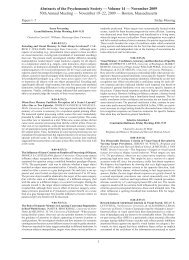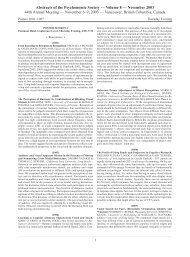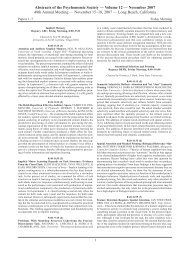Abstracts 2005 - The Psychonomic Society
Abstracts 2005 - The Psychonomic Society
Abstracts 2005 - The Psychonomic Society
You also want an ePaper? Increase the reach of your titles
YUMPU automatically turns print PDFs into web optimized ePapers that Google loves.
Saturday Evening Posters 5121–5122<br />
event, and sentences with an impossible and unlikely event. Sentences<br />
had the same words in critical regions and were normed for both possibility<br />
and likelihood. Results suggested that event likelihood and<br />
possibility had differential effects in the eye movement record. Results<br />
will be discussed in relation to Hagoort et al.’s (2004) ERP results.<br />
(5121)<br />
<strong>The</strong> Relative Importance of Language Factors in Word Skipping<br />
During Reading. DENIS DRIEGHE & TIMOTHY DESMET, Ghent<br />
University, & MARC BRYSBAERT, University of London (sponsored<br />
by Robert Hartsuiker)—<strong>The</strong> skipping probability of a word is influenced<br />
by its processing ease (e.g., predictability). Meta-analyses examining<br />
these influences report effect sizes across studies ranging<br />
from 0% to 13%, with an average of 8%. One study does not fit this<br />
picture: Vonk (1984) reported 23% more skipping of the pronoun<br />
(she) in Sentence 1 (Mary was envious of Helen because she never<br />
looked so good), in which the pronoun had no disambiguating value,<br />
than in Sentence 2 (Mary was envious of Albert because she never<br />
looked so good), where it did. We reexamined this ambiguity in Dutch<br />
and observed only an 8% skipping difference. Our results also show<br />
that when the pronoun was masculine (hij [he]), it was skipped 10%<br />
more often than the feminine pronoun (zij [she]), probably due to the<br />
141<br />
fact that in Dutch, the feminine pronoun can also be plural (they),<br />
making it potentially ambiguous.<br />
(5122)<br />
Interaction in Models of Spoken Word Recognition. JAMES S.<br />
MAGNUSON, TED STRAUSS, & HARLAN D. HARRIS, University<br />
of Connecticut—A long-standing debate in spoken word recognition<br />
concerns information flow: Is there feedback from lexical to sublexical<br />
representations, or does information only flow forward? Proponents<br />
of feedforward models cite Frauenfelder and Peeters (1998;<br />
FP98) as evidence that even in TRACE, an interactive model, feedback<br />
serves no functional role (aside from accounting for lexical influences<br />
on sublexical decisions). FP98 tested recognition time in<br />
TRACE for 21 words with lexical feedback on and off. About half<br />
were recognized more quickly without feedback. We revisited this result<br />
to see whether it generalizes to all words and whether feedback<br />
protects the model against noise. We tested all words in a 901-word<br />
lexicon under multiple levels of noise. Without noise, 73% of the<br />
words were recognized faster with feedback (we will discuss neighborhood<br />
characteristics of items recognized faster without feedback).<br />
With noise, both accuracy and response times were significantly better<br />
with feedback. In short, feedback helps.





